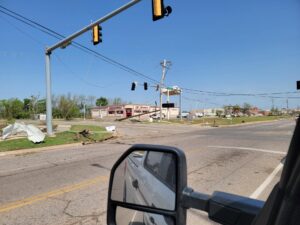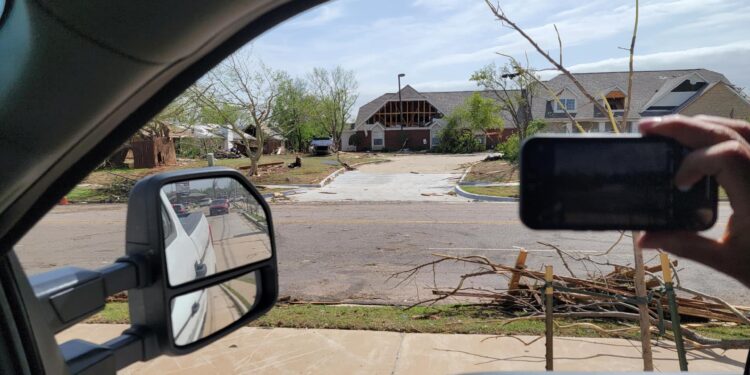“When there’s an event (ex. tornado) the tribal nations come together as a group as well the county emergency managers,” – MCN Emergency Management Director Bobby Howard
SHAWNEE, Okla. – Three people died as a result of the multiple tornadoes that tore through Oklahoma on April 19. The communities of Shawnee and Cole received extensive property damage involving thousands of structures in the area. The structures involved homes, businesses and schools. This left thousands of community members in the dark without power.
Notable locations in the area that received damage included Oklahoma Baptist University, the Shawnee Mall and the Lowe’s Home Improvement store. Muscogee (Creek) Nation Emergency Management was one of the many disaster relief and tribal agencies that provided assistance in the storm’s aftermath.
The department is part of the northeast and southeast areas which are among the five emergency management regions in Oklahoma. MCN Emergency Management Director Bobby Howard and his team were notified the day after the tornado hit that their services would be needed.
Initially they began assisting in search-and-rescue efforts. Once all residents were accounted for, they began the process of cleaning up the various debris littered across the area.
“There’s trash and power lines, and things off buildings, things off houses and shingles, and plywood,” Howard said. “There’s a lot of damage and it’s just going to take time to recover.”
For Howard, this tragic scene was nothing he had not seen before. He was one of the first people on site in Moore to assist in clean up efforts after a catastrophic EF5 tornado tore through the city almost 10 years ago in May 2013. That tornado killed 24 people, demolished 300 homes and caused an estimated $2 billion in damages.

For Howard and his department, cleaning up debris after natural disasters is a routine job. While tornado clean up comes with its own challenges, it is similar to the natural disasters the emergency management department deals with around Mvskoke Nation.
MCN Arbor Care was called out to Shawnee on Friday, April 21 to clear roads of fallen trees and limbs. The Red Cross set up resource centers in Cleveland, McClain, and Pottawatomie counties and offered free emergency supplies.
Tribal citizens affected by the tornadoes included those from Seminole Nation, Citizen Potawatomi Nation, Absentee Shawnee Nation as well as the Muscogee (Creek) Nation.
Howard said a simple thing that people can do to help in the clean-up efforts is to stay clear of the area if they can avoid it. When natural disasters devastate areas like Shawnee, or Moore it is common for sight seers to grab pictures and video of the aftermath.
“It’s hard enough when you’re trying to move around and there are power lines down and trees down and chunks of roof laying in the roads,” Howard said. “Then you throw a couple hundred people gawking at the damage that people have received. People are out there suffering, it’s pretty disheartening.”
On Monday April 24 the State of Oklahoma was approved by the White House for relief from the Federal Emergency Management Agency (FEMA). The funds will go toward helping those in need of housing repairs or temporary housing.
Initially it was reported on Thursday, April 20 that around 14,000 residents had lost power. According to Howard, that number has now been reduced to around 2,500 as of April 25.
Currently MCN Arbor Care Services and the Cemetery Clean-Up Crew programs are still in the process of assisting in cleaning up the areas affected by the tornadoes.
According to Howard, immediate clean up efforts are expected to last throughout the rest of the week. However, it will be weeks until all community operations are fully restored.
If you would like to make a donation to help the survivors of the Shawnee and Cole tornadoes you can visit redcross.org/donate, or text REDCROSS to 90999 to make a $10 donation.






why is it that the native tribes are getting extra help but if you have no tribal card you have to try to get help from places? I work for the potawatomi tribe but they tell us they aren’t helping us